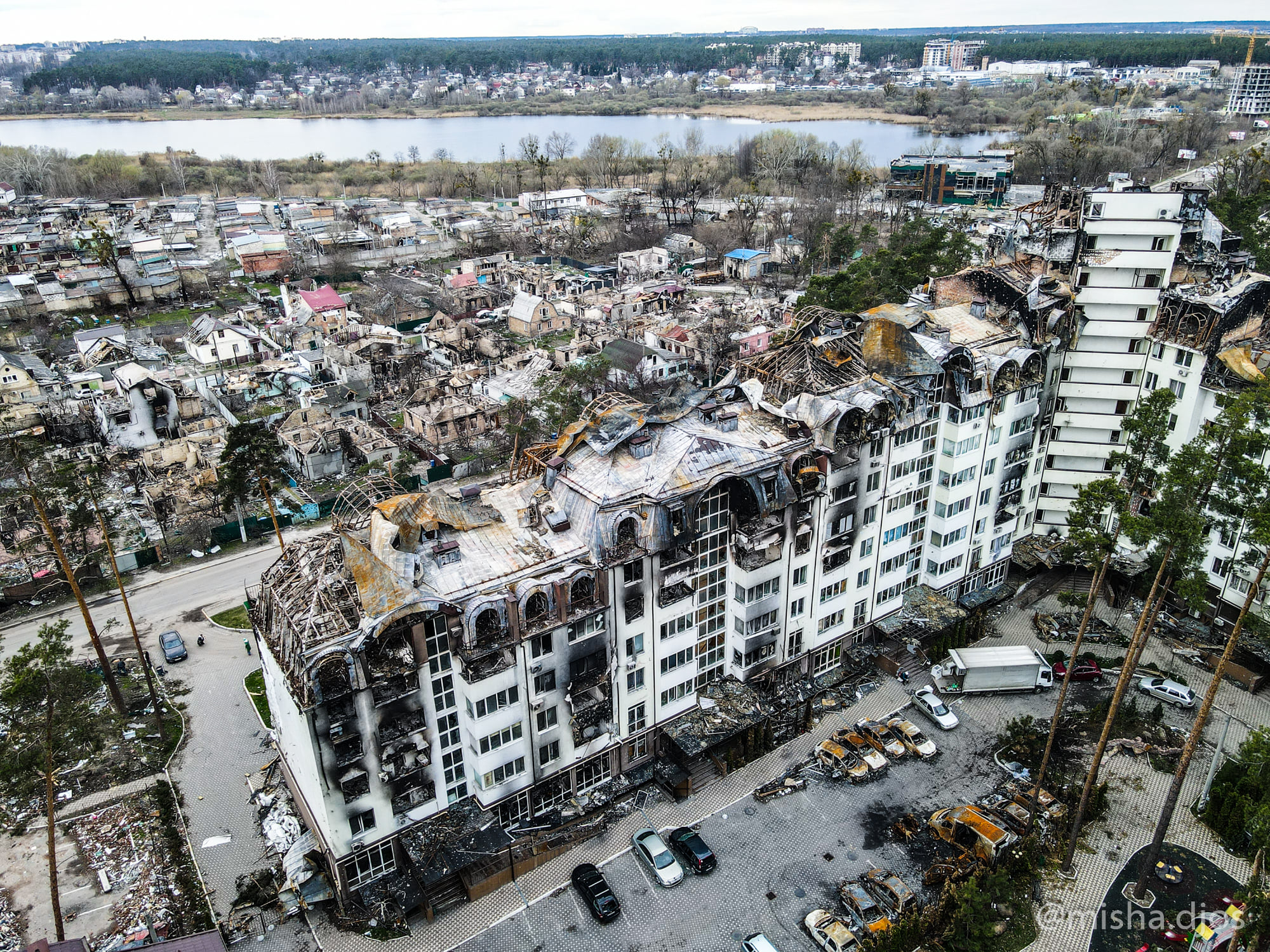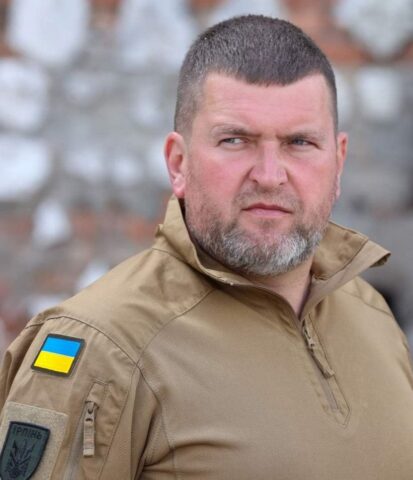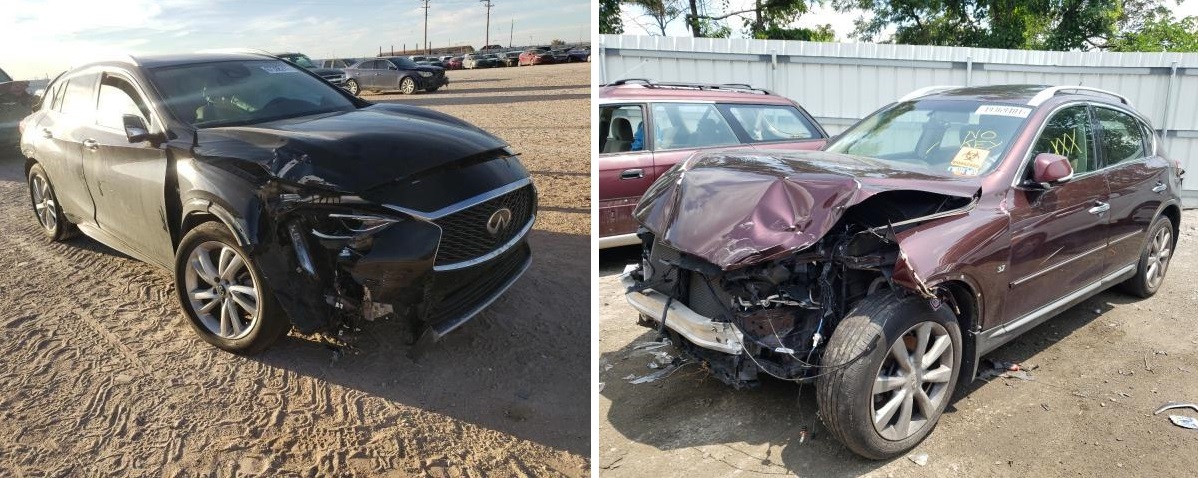A few recent months have been difficult for Oleksandr Markushyn, the mayor of Irpin. He has been under house arrest for almost three months, having spent more than a week in a pre-trial detention centre before that. The mayor’s problems were caused by the accusation about the organization of illegal trips abroad, made by Volodymyr Karpliuk, a famous builder.
Markushyn’s lawyer says that his client is facing a maximum penalty for a possible administrative offence — up to 7 years of imprisonment.
This case, which Markushyn is calling “a political put-up job”, has become widely publicized not only due to the inadequacy and selectivity of the justice system but also due to the fact that he proved himself to be a worthy leader of his community during the battles for Irpin.
This investigation has become possible thanks to the participants of the NGL.media community, who have access to special content and possibilities.
In late March of 2022, Markushyn created and headed a volunteer formation of the territorial community (VFTC). In the course of several further months, he personally asked for customs-free import of cars for this formation into Ukraine. Yet, none of these cars were received by the servicemen — the vehicles had likely been disassembled into spare parts and sold.
NGL.media found at least five such vehicles, including premium cars. If the fact of the sale (even in the form of spare parts) of the humanitarian aid is officially proven, it will mean actual prison terms for Markushyn and his partners.
“Let’s take weapons in our hands and fight for our city!”
“I would like to ask all the residents, all Ukrainians, I would like to address everyone — let’s unite! Let’s take weapons in our hands and fight for our city, every one for his own city, let’s fight for Ukraine!” was the call of Oleksandr Markushyn, the mayor of Irpin, on March 4, 2022. At that time, Russians were attacking the city from several directions, but Irpin managed to fight off — with the great contribution, made by the fighters of the local territorial defence.
Several weeks later, when the Russians were pushed from the city, a volunteer formation was established in Irpin, and Yurii Halushkin, Brigadier General and the then head of the Forces of territorial defence of the Armed Forces of Ukraine (AFU), appointed Markushyn as its commander. As per General Halushkin’s order, the care of the newly created VFTC had to be taken by the commander of the military regiment А7299 ””according to the information, received by NGL.media from the Force Command of the Forces of territorial defence of the AFU; in December 2024, the VFTC of Irpin became subordinate to the commander of another military regiment – А70423.
“The volunteer formations of territorial communities are paramilitary units, made up of local residents-volunteers. The volunteers in these formations are not servicemen, so one should discern between the VFTC and the territorial defence,” Svitlana Ilnytska, a lawyer of “LI Partners” law union, explains. “Yet, the VFTC conducts its actual activity under the guidance and control of the commander of the military regiment of the Forces of territorial defence of the AFU according to the territorial principle.”
The volunteer formations of territorial communities do not have the status of a legal entity, so they cannot have their own finances and property, and thus receive humanitarian aid directly ””According to the Law “On Humanitarian Aid”, only a legal entity may be the recipient of humanitarian aid. It means that all financing and material provisions are obtained either via the military regiment, to which the VFTC is subordinate, or via the local authorities.
“The military regiment or the local authorities have to enter the received humanitarian aid, for instance, a car, into their books, and only then can they allow the VFTC to use it while performing some tasks,” Svitlana Ilnytska explains. “It is prohibited to administer this property, including its transfer to anyone or use, with any other purposes.”
Being the mayor of Irpin and at the same time a commander of the VFTC, Oleksandr Markushyn had to know about it.
A premium crossover for the VFTC
Four months after the liberation of Irpin, Pavlo Musiets, a local resident, presented a premium crossover, Infiniti QX30, to the local VFTC. At least, this is what the act of transfer and acceptance dated August 10, 2022, with the seal of the executive committee of the Irpin city council, headed by Oleksandr Markushyn, says.
A reminder: the volunteer formation cannot receive humanitarian aid directly. Yet, Serhii Hlukhotskyi, the first deputy head of the VFTC testified personally to receiving Infiniti QX30, made in 2017.
This document was given to NGL.media by the military regiment А7299 in response to our inquiry. The servicemen claimed that this document was found accidentally while inspecting the humanitarian aid brought using the statements of the customs service. While conducting the inspection, the representative of the military regiment had a talk with Pavlo Shevchenko, hired by Pavlo Musiets to bring another crossover, Infiniti QX50, into the country “for the needs of the defence”. After that conversation, Shevchenko accidentally sent the servicemen not only the documents for QX50 but also the act of transfer and acceptance for QX30.
In the conversation with NGL.media, Pavlo Shevchenko claimed that it was only Infiniti QX50 that he had brought into Ukraine as humanitarian aid. However, he failed to explain to whom he had given this car and where he had also got the act of transfer and acceptance for Infiniti QX30.
Another crossover
Pavlo Shevchenko brought Infiniti QX50 into Ukraine on August 25, 2022, two weeks after the Irpin VFTC had allegedly received Infiniti QX30. To avoid paying customs fees, Oleksandr Markushyn wrote a letter to Mykola Tatarchuk, the then-acting head of the Volyn customs house, in which he stated that Infiniti QX50 “is humanitarian aid and will be used to implement military tasks to strengthen Ukraine’s defence”.
In his letter, Markushyn wrote that the car would be transferred by Vasyl Pavliuk, a member of the VFTC, who is also stated as a “recipient” in the customs declaration. Yet it turned out that the actual owner of Infiniti QX50 was Pavlo Musiets – it is stated in the certificate of ownership, issued by the Department of Transport of Pennsylvania (the USA). This leads to the conclusion that Pavliuk and Musiets were business partners.
The letter, written by Oleksandr Markushyn, played its part, and the customs officials let Infiniti QX50 pass as humanitarian aid, without any customs fees. However, his promise to use the car “to strengthen Ukraine’s defence” remained only on paper because, having crossed the border, the vehicle just vanished.
NGL.media managed to find out that in several months of 2022, at least five cars had been brought to Ukraine without any customs fees thanks to Markushyn’s letters, yet none of them reached the servicemen.
The traces of the cars get lost
As we have already stated above, the VFTC cannot receive humanitarian aid, including cars. They could have been received by the military regiment A7299 or the Irpin city council instead, who would have to enter them into their books and only then let the VFTC use them.
In response to the inquiry of NGL.media, Oleksii Khorolskyi, the lieutenant colonel and the commander of the military regiment А7299, which controls the Irpin VFTC, stated that he had not received any of the five imported cars.
Neither the Irpin city council nor the local VFTC had seen these cars. At least, these were the official replies (one, two, three) received by NGL.media from Oleksandr Markushyn, who heads both establishments.
However, the mayor of Irpin failed to explain why he had asked the customs house to let these cars be brought into the country as humanitarian aid for the VFTC, headed by him, and why the VFTC had not received these cars at all. Oleksandr Markushyn refused to talk to NGL.media.
“These cars require large investments”
We found the abovementioned crossovers Infiniti QX30 and Infiniti QX50 using their VIN-codes ””VIN-code or identification number of the vehicle is a unique serial number, which states the code of the producer, the type of the vehicle, the year of its production, its serial number, technical characteristics, etc. in the American online auction of damaged cars after insurance incidents. Both cars were bought at the end of 2021.
Serhii K, the head of the auto-repair shop, believes at least four thousand dollars should be invested to repair only the visible damage of each car ””when approached by NGL.media, he agreed to consult us on condition of anonymity. “These cars require large investments. To buy and bring them here, to pay for their repair — it will not be cheap. It takes about three thousand dollars just to deliver a car from America. If you put it all together, it will amount to the cost of another car,” he said.
Therefore, usually volunteers, supplying the AFU with cars, do not buy them in the USA. According to Sviatoslav Litynskyi, a member of the volunteer initiative “Travel. Love. Drive Pickups”, during the first year of the full-scale war, the cars were usually brought from neighbouring Poland, and now, after Poland has been “sold out”, they bring cars from Germany, the Baltic states and even Great Britain. It costs about EUR 400–600 on condition of spending one night, i.e. including hotel expenses.
The volunteers of “Travel. Love. Drive Pickups” have already brought over three thousand cars for the army, but Litynskyi cannot recollect even one Infiniti among them. “It is obviously expensive to repair Infiniti. This car might be suitable for the frontline, because everything that still drives is suitable there. But there is always the issue of the price and what we receive for it. The most frequent requests from the servicemen are pickups, the most popular ones being Nissan, Ford, and Mitsubishi,” Litynskyi says.
The thought about crossovers Infiniti being not the best choice for the frontline is reiterated by the owner of the auto-repair shop, asked by NGL.media. “These cars are rather premium class, it is just not reasonable to use them there. More durable cars are required, not to have any problems with spare parts. It takes a long time to wait for those spare parts,” Serhii K. explains. ””he agreed to consult us on condition of anonymity.
Breaking it into details
Common civil owners of Infiniti have to deal with long periods of waiting and high costs as well. This is where such do-it-yourself wizards, as Pavlo Musiets and Vasyl Pavliuk, come to their rescue.
Pavlo Musiets has been dealing with the buyup of cars after accidents for a long time. He mainly specializes in Infiniti which he disassembles to sell spare parts. According to the data of Market Inside, in January-March 2022 alone, Pavlo Musiets brought at least four cars from the USA into Ukraine, two of which were Infiniti. The subscribers usually record his telephone number as “Infiniti Disassembly Pasha Irpin” or “Pavlo Musiets Spareparts Disassembly QX50”.
Vasyl Pavliuk brings Infiniti after accidents into Ukraine too, and they are disassembled in his own auto-repair shop in Irpin. This fact was confirmed by Viktor Perekhrestenko, his companion, in the conversation with NGL.media. Perekhrestenko also sells the spare parts from the disassembled Infiniti in a shop in Bucha, on the market platforms Avtopro and OLX.
This investigation has become possible thanks to the participants of the NGL.media community, who have access to special content and possibilities.
“Before the war, we had worked together [with Pavliuk and Musiets] in a “disassembly shop” on their territory. There were about 10 cars at that time which we had brought together. Then, we parted our ways. Because the ones we had been disassembling in Irpin burnt down,” Perekhrestenko claimed. He said that after the beginning of the Russian invasion he had not received any cars from Pavliuk or Musiets and works separately now.
Serhii K., the owner of the auto-repair shop, says that if Infiniti cars, brought as humanitarian aid, are disassembled, one may get about 10 thousand dollars for each car. “For instance, one engine from this car can be sold for 2–3 thousand dollars, the automatic can go for about a thousand or more.”
Vasyl Pavliuk and Pavlo Musiets refused to confirm or deny the hypothesis of NGL.media that the humanitarian aid cars, about which the mayor of Irpin had asked personally, had been disassembled and sold as spare parts. “You’d better start writing fairy tales,” was the answer of Musiets, who refused to talk about the destiny of the crossovers he had brought into the country.
According to the data of the customs house, in addition to Infiniti QX30 and Infiniti QX50, the military regiment A7299 should have received three more cars, brought in at the request of the mayor of Irpin as humanitarian aid — Nissan Navara, Volkswagen Touran, and Volkswagen Transporter. In all these cases, Oleksandr Markushyn addressed the customs house personally and officially asked them to let the cars be exempt from paying the fees.
The sender of one of these cars, Volkswagen Touran, is stated in the customs declaration as the union of Ukrainians from the German Augsburg, Ukrainischer Verein Augsburg e.V. Kateryna Matey, the executive director of this organization, was surprised by the questions of NGL.media about their relations with the Irpin VFTC. “We have never sent any cars for servicemen,” she assured. “Our activity is strictly humanitarian, and according to the German legislation, we have no right to provide aid to the servicemen.”
The sale of humanitarian aid during martial law is punished by actual imprisonment
Five cars, brought into Ukraine without the customs fees at the request of Oleksandr Markushyn, have just vanished. None of them was registered in the database of the Ministry of Internal Affairs — it seems that they had just been disassembled into spare parts. It is likely that the number of such cars is larger, but the State Customs Service refused to provide NGL.media with the information about all the cars, brought as humanitarian aid for the Irpin VFTC.
“If the fact of the sale of humanitarian aid, even the disassembly of cars into spare parts, is proven and the amount of the incurred losses is at least 350 non-taxable incomes of citizens (over UAH 435 thousand as of 2022), these actions should be qualified according to part 3 of Art. 201-2 of the CCU as the sale of humanitarian aid during martial law,” Svitlana Ilnytska, a partner in “LI Partners” law union, explains.
The sale of humanitarian aid is punished by five to seven years of imprisonment with the confiscation of the property.
If the investigators fail to prove that the incurred loss amounted to over UAH 435 thousand, this case may be qualified as fraud (Art. 190 of the CCU), which, during martial law, may mean a fine of UAH 68–136 thousand or imprisonment for over three years.
The author Yelyzaveta Chyp, editor Oleh Onysko, translation Nelya Plakhota, cover Viktoria Demchuk




